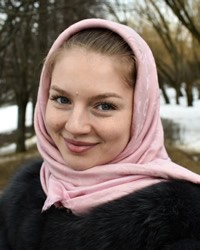Russian in Kazakhstan

Photo Source:
AV Photographer - Pixabay
|
Send Joshua Project a map of this people group.
|
| People Name: | Russian |
| Country: | Kazakhstan |
| 10/40 Window: | Yes |
| Population: | 3,116,000 |
| World Population: | 135,185,800 |
| Primary Language: | Russian |
| Primary Religion: | Christianity |
| Christian Adherents: | 55.00 % |
| Evangelicals: | 1.23 % |
| Scripture: | Complete Bible |
| Ministry Resources: | Yes |
| Jesus Film: | Yes |
| Audio Recordings: | Yes |
| People Cluster: | Slav, Eastern |
| Affinity Bloc: | Eurasian Peoples |
| Progress Level: |
|
Introduction / History
Russian traders and soldiers first came to Kazakhstan in the 1500s. Russians built forts which later became cities. With the Kazakhs at war with Kalmyks, Russians seized some of the land. The Kazakhs were torn between conflict with both the Kalmyks and Russians. Since the 19th century there has been a large number of Russians in Kazakhstan. WWII produced the largest Russian migration into Kazakhstan. By 1959 42.7% of Kazakhstan's population was Russian.
When Kazakhstan gained independence from the USSR, Russian was the language of government and business. However, after independence, there was the strong move to form Kazakhstan as the birth of the Kazakh people. For many Russians they saw this as an affront to the multi-cultural area. Kazakh was made the official language and a large number of Russians were removed from government.
Many Russians migrated back to Russia and by 1999 the percentage of Russians in Kazakhstan dropped to 30%. Most Russians who remained in Kazakhstan were 2nd or 3rd generation. Though Russian is not the official language many in the country are bilingual. Russians also continue to influence the country in civil and government offices.
Where Are they Located?
Russians are located primarily in the north, north-west, and north-east regions of Kazakhstan that border Russia. Also, there is a large population of Russians and Russian-speaking minorities in the city of Almaty (former capital of Kazakhstan) in the south.
In the country as a whole, ethnic Russians constitute just under one third of the population. They are racially, linguistically, culturally and religiously distinct from the Kazakh majority.
What Are Their Lives Like?
Most of the Russians in Kazakhstan live in urban areas and culturally their lives are similar to the lives of those in Russia. They still watch primarily Russian TV channels and programs, listen to Russian and foreign music, and cook Russian food (as well as some Central Asian dishes). Many city-dwellers also have a small plot of land outside the city (called "dacha") where they grow vegetables, fruit trees, and berry bushes.
What Are Their Beliefs?
Most of the Russians in Kazakhstan would say they are traditionally Russian Orthodox believers (approx. over 90%) even though some of them might not believe there is a God. Maybe one out of ten Russians would actually attend the Russian Orthodox church (primarily older people and that only on major holidays like Christmas and Easter).
So the majority would be very nominally Russian Orthodox and, in fact, have a mixture of atheism, universal power/God, folk beliefs/traditionalism, with a throw-in "new age horoscope and aliens" "pie" of a belief system (not really a system).
Young people are more interested in getting a good education, learning different languages, and making a career in order to leave Kazakhstan if given the opportunity.
Evangelical Christians are less than a half of a percent of the population of Kazakhstan and are usually Russian-speaking (very few Kazakh believers). With the new religious law being enforced in Kazakhstan, it is harder for evanglical communities to survive. The government agencies propagate against Evangelical Christians and portray them as dangerous sects and cults through media and education.
What Are Their Needs?
Some of their basic needs are for the protection of human rights (especially where there is religious persecution), equality instead of discrimination (e.g. equal employment opportunities), opportunities to preserve their ethnic, linguistic and cultural identity.
It is sad to see the continued migration of Russians out of Kazakhstan because it also means "brain-drain" for Kazakhstan (with total population of less than 16 million people).
Since at least 2011, in the name of curbing extremism, religion laws in violation of the freedom of religion guaranteed in the Kazakhstan Constitution require churches to register and various local governments have been banning religious groups that have less than 50 members, confiscating literature, and fining groups that have violated these religion laws. As of October 2012, a third of all religious groups have been reportedly shut down. Unregistered Protestant groups, which seem to be particularly targeted, have been forced underground, but even then the government has sought to crack down on such groups by raiding the homes where these groups have been meeting.
As of March 2013, proposed changes to the criminal code threaten to imprison the leaders of unregistered religious groups. Christians have also been targeted since January 2013 for distributing religious literature on the streets or for otherwise sharing their faith.
Prayer Points
peaceful living of Russians along with other ethnicities in Kazakhstan
economic development and political stability
religious freedom and strengthening of the Evangelical communities